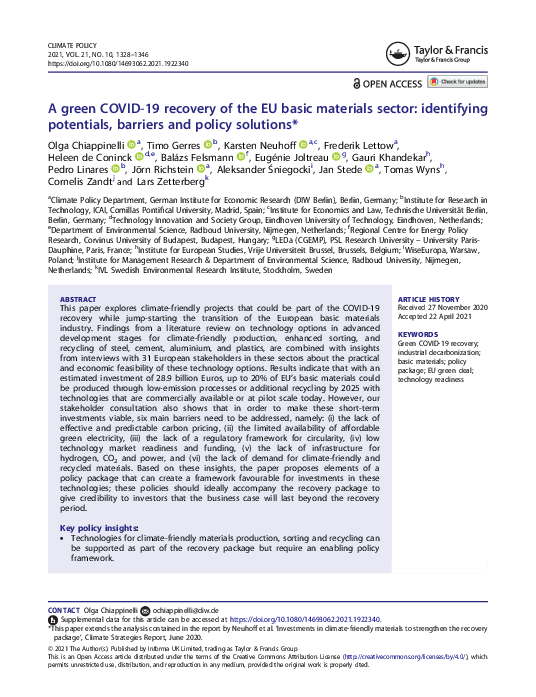A green COVID-19 recovery of the EU basic materials sector: identifying potentials, barriers and policy solutions

2021
21
10
1328-1346
epidemic disease ; economic recovery ; sustainable development ; decarbonization ; technological change ; environmental policy ; climate change ; EU policy
Economic development
https://doi.org/10.1080/14693062.2021.1922340
English
Bibliogr.
"This paper explores climate-friendly projects that could be part of the COVID-19 recovery while jump-starting the transition of the European basic materials industry. Findings from a literature review on technology options in advanced development stages for climate-friendly production, enhanced sorting, and recycling of steel, cement, aluminium, and plastics, are combined with insights from interviews with 31 European stakeholders in these sectors about the practical and economic feasibility of these technology options. Results indicate that with an estimated investment of 28.9 billion Euros, up to 20% of EU's basic materials could be produced through low-emission processes or additional recycling by 2025 with technologies that are commercially available or at pilot scale today. However, our stakeholder consultation also shows that in order to make these short-term investments viable, six main barriers need to be addressed, namely: (i) the lack of effective and predictable carbon pricing, (ii) the limited availability of affordable green electricity, (iii) the lack of a regulatory framework for circularity, (iv) low technology market readiness and funding, (v) the lack of infrastructure for hydrogen, CO2 and power, and (vi) the lack of demand for climate-friendly and recycled materials. Based on these insights, the paper proposes elements of a policy package that can create a framework favourable for investments in these technologies; these policies should ideally accompany the recovery package to give credibility to investors that the business case will last beyond the recovery period."
Digital
The ETUI is co-funded by the European Union. Views and opinions expressed are however those of the author(s) only and do not necessarily reflect those of the European Union or the ETUI.